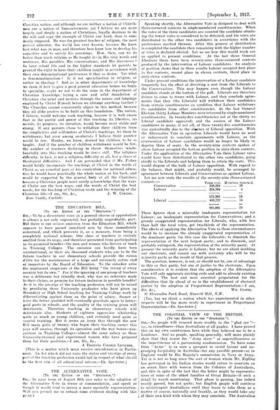THE EDUCATION BILL.
[TO THE EDITOR or THE SPECTATOR."1
SIR,—To be a dissentient voice in a general chorus of approbation is always a not only ungrateful, but probably unprofitable, part. But there is one serious omission from the Education Bill, which appears to have palmed unnoticed save by those immediately concerned, and which prevents it, as a measure, from being a completely national scheme. One clam of teachers is entirely emitted from its scope, and therefore prevented from participating in its promised benefits—the men and women who lecture or teach in Training Colleges. The omission can hardly have been unintentional, as their six thousand students who are to be the future teachers in our elementary schools provide the raison dPi4re for the ranintenence of a large and extremely active staff of inspectors by the Board of Education. To the onlooker arise the unpleasant suspicions of the Bill being "the friend of every country but its own." For if the ignoring of one group of teachers was a deliberate but friendly deed, why was no reference made to their claims, or promise for future inclusion in possible benefits? As it is, the prestige of the teaching profession will not be raised by penalizing them University graduates who have given up Secondary or High School teaching for Training College work by differentiating against them on the point of salary. Sooner or toter the better enimlitied will eventually gravitate again to better- pnid posts in schools. and the quality of the training given will deteriorate. Therefore teaching in elementary schools will deteriorate also. Students of eighteen appreciate scholarship quite as much as young children, and certainly need quite as eareful training. But it seems an irony that through the new Bill many girls of twenty who begin their teaching career this year will receive, through its operation and the war bonus—non- existent in Training Colleges—almost the same salary as those University-trained and experienced women who have prepared them for their positions.—I am, Sir, Ac., A TRAINING COLLEGE LECITHER.
[This is a matter which must receive consideration in Parlia- ment. An Act which did not raise the status and prestige of every part of the teaching profession would fail in respect of what should be the first aim of all educational reform.—En. Spectator.]


































 Previous page
Previous page